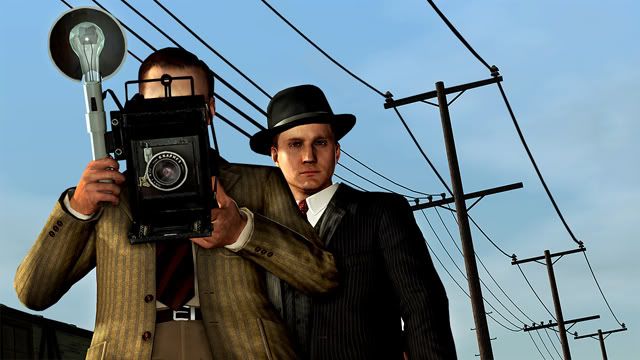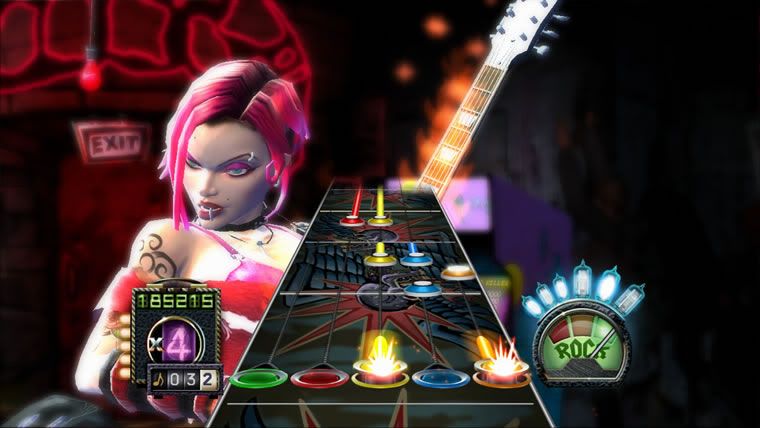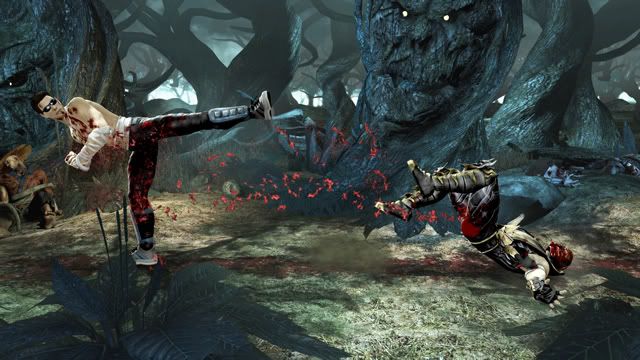The Future of Video Games is Bleak
|
|
On 04/16/2012 at 09:57 PM by Julian Titus See More From This User » |
This is a blog series I wrote last year. I’m bringing it to PixlBit in preparation for the next episode of PixlTalk, wherein the Tri-Force crew talks about the future of video games.
I didn’t want to start my “Future of Video Games” series off on a downer, but I couldn’t resist such an eye-catching title for this first part. Besides, I don’t consider myself to be a negative person in general, so I wanted to get my fears about the future off my chest right now so I can continue in a more positive direction for the rest of this series. I think there tends to be a very jaded and cynical sentiment expressed amongst gamers in general, but especially when it comes to the future of our mutual hobby. I pride myself on being a life-long gamer that has avoided becoming jaded, but I would be lying if I said I had 100% confidence that the future of the industry is going to be a magical, shiny place full of chocolate flowers and gumdrop houses. So let’s get into some of my concerns, shall we?
Rising Costs in Game Development
I touched on this just a bit in my previous entry, but it’s a large enough concern that I could probably write an entire blog post just on this subject. With each generation, the cost of development increases. It is something I’ve been reading about since the PlayStation and Saturn came out, and with them, actual 3D polygonal games on a large scale. I remember reading that the budget on games increased by a large margin when the PS2 generation came about, but that was just a drop in the bucket when compared to game development in the HD era. There’s the obvious fact that it takes longer to create the more detailed art assets needed to populate the realistic worlds being crafted, but the problem goes beyond that. The audience that consumes video games is becoming more sophisticated, and it seems as if each new game released needs to one-up the games that came before it, lest it be considered irrelevant upon arrival. If you really look at things objectively, the graphical quality of games has improved tremendously across the board. Even rushed movie tie-ins at least look good now, and it has gotten to the point that enthusiasts will criticize anything but the bleeding edge of graphical prowess. A great example is Duke Nukem Forever. People go on and on about how terrible the game looks, but really had the game came out just a few years ago, I think it would be a different story. But in a post-BioShock/Gears of War/GTA IV/etc. world it’s impossible to compete with merely “good” graphics.
So, to keep up with the graphics arms race, companies are needing to throw more and more artists at their projects. That means more outsourcing. That means longer development times. That means development costs an order of magnitude higher than seen in the previous generation. And ultimately for the end user, that means higher priced games and less original IPs being created. At this point in the current generation we should be seeing lower-tier new releases coming out at reduced prices, but this is a rare occurrence, because the fact of the matter is that publishers are having a tough time breaking even, let alone make a profit. There have been plenty of good development studios that have shut down this console cycle, and we’ll likely see more closings before the next generation gets underway. Fewer studios mean fewer people to take chances and create the next big thing. It’s becoming less and less likely that the next big franchise will come out of some upstart, independent studio like Insomniac. As it stands, we could see all of the smaller studios absorbed into the mega-publishers like Activision and EA, and we’ll just get the same games repackaged to us year after year.

L.A. Noire was a gorgeous game, but it cost a fortune to create, and bankrupted Team Bondi.
Future Space Marine Shooter XV: The Reckoning
A lot of people complain about the sequel-centric nature of the video game industry. Go to any enthusiast website and you’ll find comment after comment, discussion after discussion lamenting the plethora of sequels released every year. I’m not one of those people; in fact I’m quite the opposite. I’ll be talking more about sequels in a later installment of this series, but I do have concerns regarding the annual sequel. Activision is notorious for this; when they purchased Vivendi and famously decided not to publish Ghostbusters and Brutal Legend, the reasoning was that Activision didn’t believe these games were franchises that could be exploited on a yearly basis. It is difficult to argue with the results of Activision’s strategy in this matter; the Call of Duty franchise breaks records with almost every release. The problem I have with yearly franchise iterations is that, with each title, there is a risk of franchise fatigue that can lead to consumers losing interest. I felt that both the Ratchet and Clank and Splinter Cell series were in danger of becoming played out and tired. Today, the Assassin’s Creed series seems to be walking that tightrope, as well. Personally, I prefer at least two years between sequels, or if a publisher insists on yearly releases I think they should do three and then rest the series. This allows development teams to change gears and try something new, perhaps even coming up with a fresh take on the series they have been working on. It’s a lot like farming; you don’t want to over-harvest your fields, so you leave land to rest and rotate your crops each season. As we move into the next generation and costs rise once again, I worry that publishers will turn into sequel factories that generate quick and dirty cash grabs. This doesn’t do anyone any favors in the long run. It could result in jaded, burned out game designers, cause gamers to lose interest, and possibly bring the whole industry to another crash like what was seen in 1983.

Guitar Hero was a franchise that was milked into oblivion.
Project Ten Dollar
For the past few years there’s been a pretty nasty debate over the used game market. As someone who was part of that market in a big way and is now trying to get into the development side of the industry I can see the validity of both arguments. To be honest, I don’t think publishers and developers have a problem with used games as a concept. I think a lot of this has been backlash from the way Gamestop has seemingly taken over the world with their low buybacks and ridiculously high used prices. I think the used market is ultimately a good thing for the industry, as it gives people a chance to find games that have long since vanished from the shelves of stores that only deal in new software. But it is also a fact that, until the current generation of consoles, publishers didn’t see a penny of used game sales. That has changed with the advent of downloadable content. Odd, then, that so many companies have decided to lock certain features behind a single-use download code, which means that any used game purchasers would need to spend extra money if they want to access this content.

If you want to play Mortal Kombat online, you need to buy it new, or pay an extra ten bucks.
I’ve been torn on this for a while now. Now that I make enough money to support my video game habit I tend to buy all of my games brand new. I’d be hard pressed to tell you the last time I bought a game used, but I remember the days when I could barely afford to buy a new release after trading in a couple games. I can sympathize with people who have to wait for used copies of their favorite games to pop up. So far, I’ve seen most of the single-use codes as added value; items that aren’t crucial to the gameplay experience but add a little bit to the story or combat. When done correctly it not only feels like an awesome freebie, but can lead to added revenue for the publisher. Alan Wake was a complete experience for me, but I was glad to get the first DLC episode for free with my purchase. I liked it so much that I was sure to purchase the final episode when it was released. This can backfire, however, when the user feels like they are being denied content that should be part of the game. Mortal Kombat was the most recent offender here, locking the online modes with a single-use code. Online multiplayer is a huge component of the fighting game genre, and for people who have to purchase the game used this can feel like a major element of the game is simply missing. While this may get the publisher some extra money from the used market, it also generates ill-will from the users. A smarter thing would have been to give people who purchased the game new the first add-on character for free. This may have generated more new sales, and I think people who bought the game used might get online and see how cool that character is and decide to purchase it for themselves.
This is a slippery slope we find ourselves on as we move forward. Bobby Kotick, the CEO everyone loves to hate, has already talked about wanting to lock the final boss or level of a game behind a single-use code, thereby denying second-hand users from being able to finish a game without plunking down an extra ten bucks. That may be too much even for Activision to implement, but there’s a very real possibility of significant game modes and features becoming part of the “used game tax”. DLC needs to be content that adds value to an already complete game and not something taken out to make a quick buck.
That was a lot of doom and gloom, but in reality, I’m ever excited for the future of the video games industry. Now that I have gotten my concerns off my chest I can talk freely about my hopes for the future, and why the 8th generation may well make the 7th generation seem like child’s play. Join me all week as I gaze into my crystal ball and tell you what I see, won’t you?



Comments